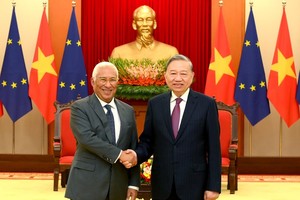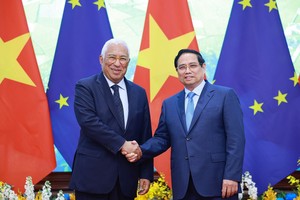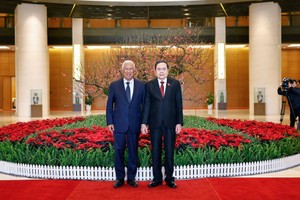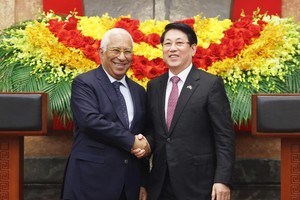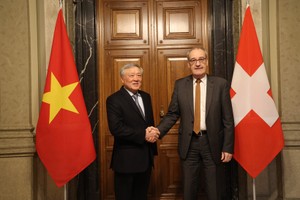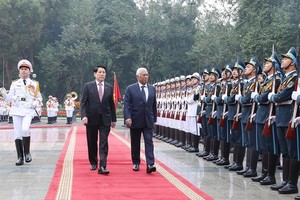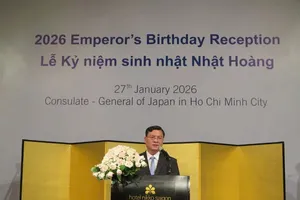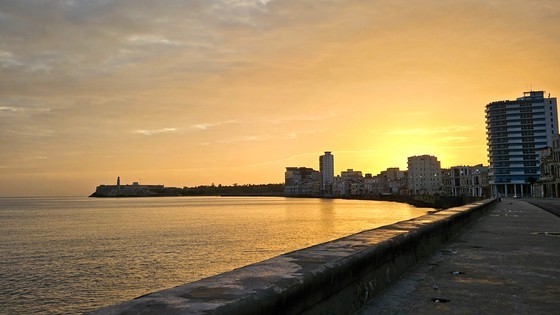 |
El Malecon Beach |
According to the Cuban National Information and Statistics Office, in the first five months of this year, the nation received over 1.44 million international tourists, up 177 percent compared to the same period in 2022. Among these, Canada continues to be the leading source market with 544,763 Canadian visitors to Cuba, followed by the US with 67,615 visitors, and Russia with 55,413 visitors, as well as Germany, Spain, and France. Particularly remarkable, during the first five months of 2023, more than 145,000 Cuban expatriates residing abroad returned to their homeland for a visit.
An increase of 177 percent year-on-year
After returning from their trip to the capital city of La Habana, Harold Simon, residing in Toronto, Canada, described those days as the most enjoyable for him and his family. In Cuba, they dedicated most of their time to sunbathing, surfing, and immersing themselves in the crystal-clear waters at El Malecon Beach.
"Cuba has a warm and sunny climate year-round, with daytime temperatures rarely dropping below 26 degrees Celsius, so it is truly wonderful for tourism," said Harold Simon, who also mentioned that he is willing to visit Cuba many more times.
Sharing a similar viewpoint, Belle Serrano, living in Madrid, Spain, noted that her family visits Cuba at least once almost every year. She is deeply drawn to the history, culture, and distinctive architectural charm of La Habana.
"After touring La Habana, my usual destination is the beachside resort area of Varadero, a mere 140km from the capital. When you are here, it is a must to savor the music and cuisine authentically representing the Cuban countryside," Belle Serrano enthusiastically shared her extensive travel experiences in Cuba.
Recognizing tourism as a strong point, Cuba has set a goal to welcome 3.5 million tourists this year. The Caribbean nation is focusing on efforts to recover Latin American markets such as Argentina, Colombia, Bolivia, and Brazil.
According to the Cuban Ministry of Tourism, recently, foreign companies have shown increasing interest in investing in this Caribbean island nation, particularly in the "smokeless industry" sector. Official figures reveal that there are currently 87 foreign investment projects in the tourism sector in Cuba, along with 18 foreign hotel chains operating in the country.
Juan Carlos Garcia Granda, Cuban Minister of Tourism, stated that Canada - their primary tourism market - has already recovered by 80 percent. The Cuban Government anticipates a GDP growth rate of 3 percent in 2023.
Sustainable tourism development
Not only concentrating on attracting international tourists, but Cuba is also actively advancing sustainable tourism development. To achieve this, Cuba is taking measures to safeguard its beaches and conserve biodiversity in response to the challenges posed by climate change in the Caribbean region.
In a press statement, Mr. Elba Rosa Perez, Cuban Minister of Science, Technology, and Environment, revealed that the country aims to build more hotels situated farther away from coastal areas. This strategy serves a dual purpose: expanding tourism opportunities while addressing the potential threat of rising sea levels in the upcoming decades.
Simultaneously, Cuban authorities are implementing numerous investment projects to enhance water resource management. "The tourism industry has evolved into and remains a strategic sector, making substantial contributions to socio-economic development while aligning with environmental conservation objectives," emphasized the Cuban Minister of Science, Technology, and Environment.
Moreover, Cuba is actively pursuing ambitious projects to secure the sustainable growth of its tourism industry, particularly in the picturesque islets often described as "paradise" in the Northern region of the country. As part of this initiative, islets like Santa Maria, Las Brujas, and Ensenachos are envisioned to transform into eco-friendly resort destinations, prioritizing the preservation of their inherent natural beauty.
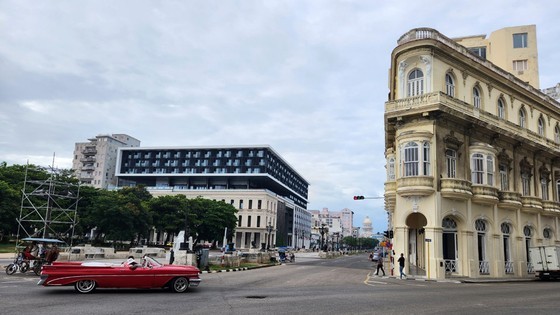 |
The streets in the capital city of La Habana are spacious, with few car horns. |
On these islets, Cuba has built five wastewater treatment facilities to filter wastewater from hotels, with a monthly filtration capacity ranging from approximately 20,000 to 30,000 cubic meters. The treated wastewater can subsequently be employed for irrigation purposes. To guarantee a water supply, a desalination plant using reverse osmosis technology will be constructed, capable of providing 50 liters of pure fresh water per second to the resorts.
Santa Maria, Las Brujas, and Ensenachos islets are integral components of the Buena Vista Gulf ecosystem, which has been acknowledged by UNESCO as a Biosphere Reserve. The Cuban Government has made substantial investments in diverse recycling and waste treatment technologies within this area.
These islands are situated off the Northern coast of Villa Clara Province, and they are interconnected with each other and the main island through a 48km-long artificial causeway with over 40 bridges. This causeway construction project was initiated in 1989 as a component of the tourism development strategy spearheaded by the former leader, Fidel Castro.
Proposal for direct flight route between Vietnam and Cuba
At the Vietnam-Cuba Business Promotion Forum in Hanoi on September 30, 2022, numerous business representatives shared their experiences while doing business in Cuba. They also presented recommendations to the governments of both nations to bolster economic, trade, and investment collaboration between Vietnam and Cuba.
Accordingly, business representatives recommended that the governments of both countries facilitate the establishment of a direct flight route connecting Vietnam and Cuba via Vietnam Airlines, with the aim of boosting trade between the two nations.
Moreover, enterprises proposed that the Cuban Government permit Vietnamese enterprises investing in Cuba to import personal vehicles, given the transportation challenges in Cuba. They also called for direct recruitment by businesses without intermediary agencies, tax incentives to avoid double taxation, and the issuance of long-term visas.



